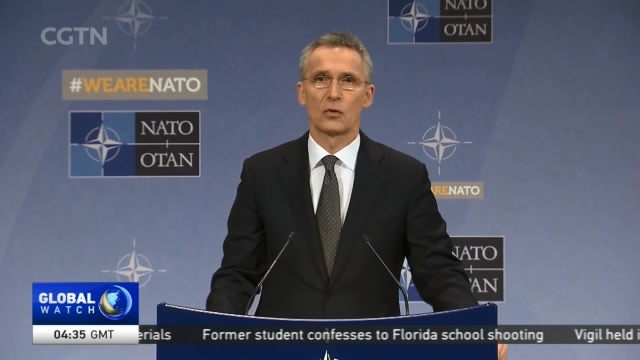
13:21, 16-Feb-2018
NATO Meeting: Defense ministers wrap up talks and make key decisions

NATO defense ministers have wrapped up two days of talks in Brussels on Thursday. Key decisions made include changes to the NATO command structure and a new training mission in Iraq. Mariam Zaidi has more.
The message at the two day summit of NATO defence ministers was clear. In a challenging security environment and with the ongoing threat of terrorism, DPRK and Russian aggression on their border, the North Atlantic Treaty Alliance was in need of an upgrade.
JENS STOLTENBERG NATO SECRETARY GENERAL "The security environment in Europe is changing and so NATO is responding. Last November Defence Ministers agreed in principle to the design for an adapted NATO command structure. It will place greater focus on maritime security, logistics and military mobility and cyber defence."
On Wednesday allies agreed to form two new command hubs. A Joint Force Command for the Atlantic to help protect sea lines of communication between North America and Europe. And a second hub, to improve rapid deployment of troops and equipment within Europe.
Adaption and repurposing of the alliance was welcomed by the US, who under Donald Trump have been pushing European NATO allies to do more. Especially as the European Union has taken steps to strengthen its own cooperation in security and defence.
JAMES MATTIS US SECRETARY OF DEFENSE "I'm confident that it will take constant work because of course any organisation will always expand. It's kind of in the nature of international organisations, but there is a clear understanding to include in written EU documents that the common defence is a NATO mission and NATO mission alone."
Defence ministers also agreed to establish a long term training mission in Iraq to keep terrorism at bay after the defeat of ISIS in Iraq and Syria.
URSULA VON DER LEYEN GERMAN DEFENSE MINISTER "We need to stand at the side of Iraq, the whole Iraq, the Central Government as well as the Kurdish regional government to go into a stage of stabilisation of reconstruction and of capacity building."
MARIAM ZAIDI BRUSSELS "NATO is moving forward. But expansion requires more defence spending. Currently only eight allies are on track to meeting NATO guidelines to spend 2% of their GDP on defence this year. Mariam Zaidi, CGTN Brussels."

SITEMAP
Copyright © 2018 CGTN. Beijing ICP prepared NO.16065310-3
Copyright © 2018 CGTN. Beijing ICP prepared NO.16065310-3